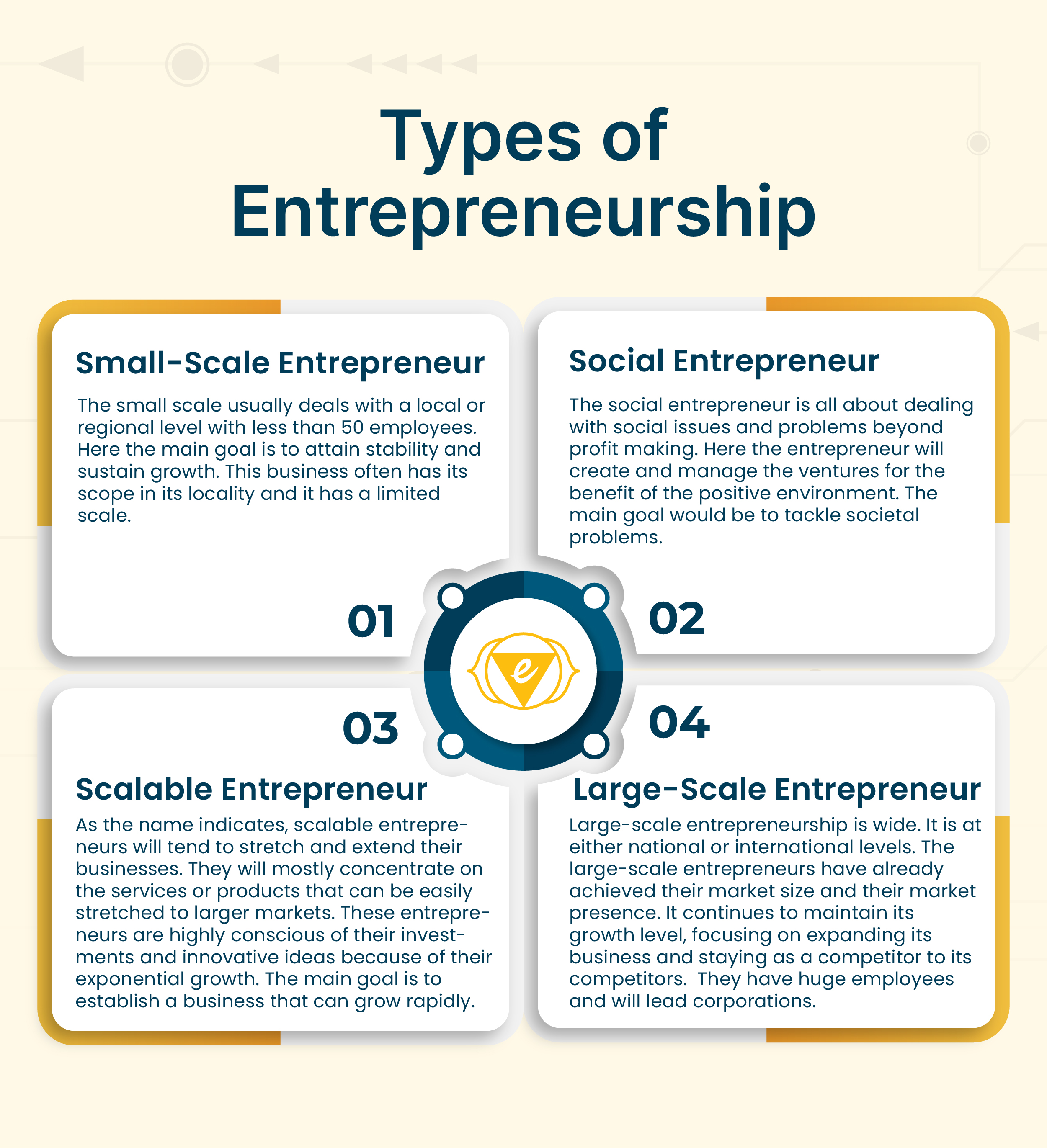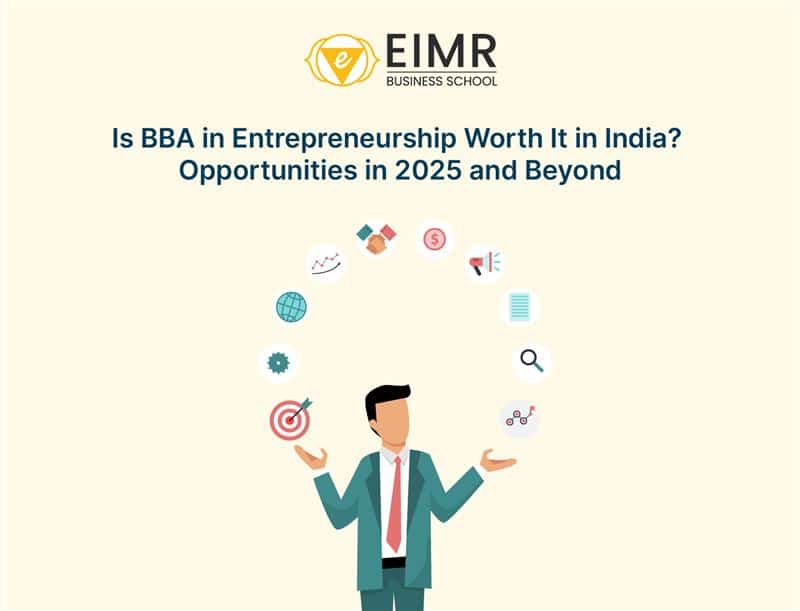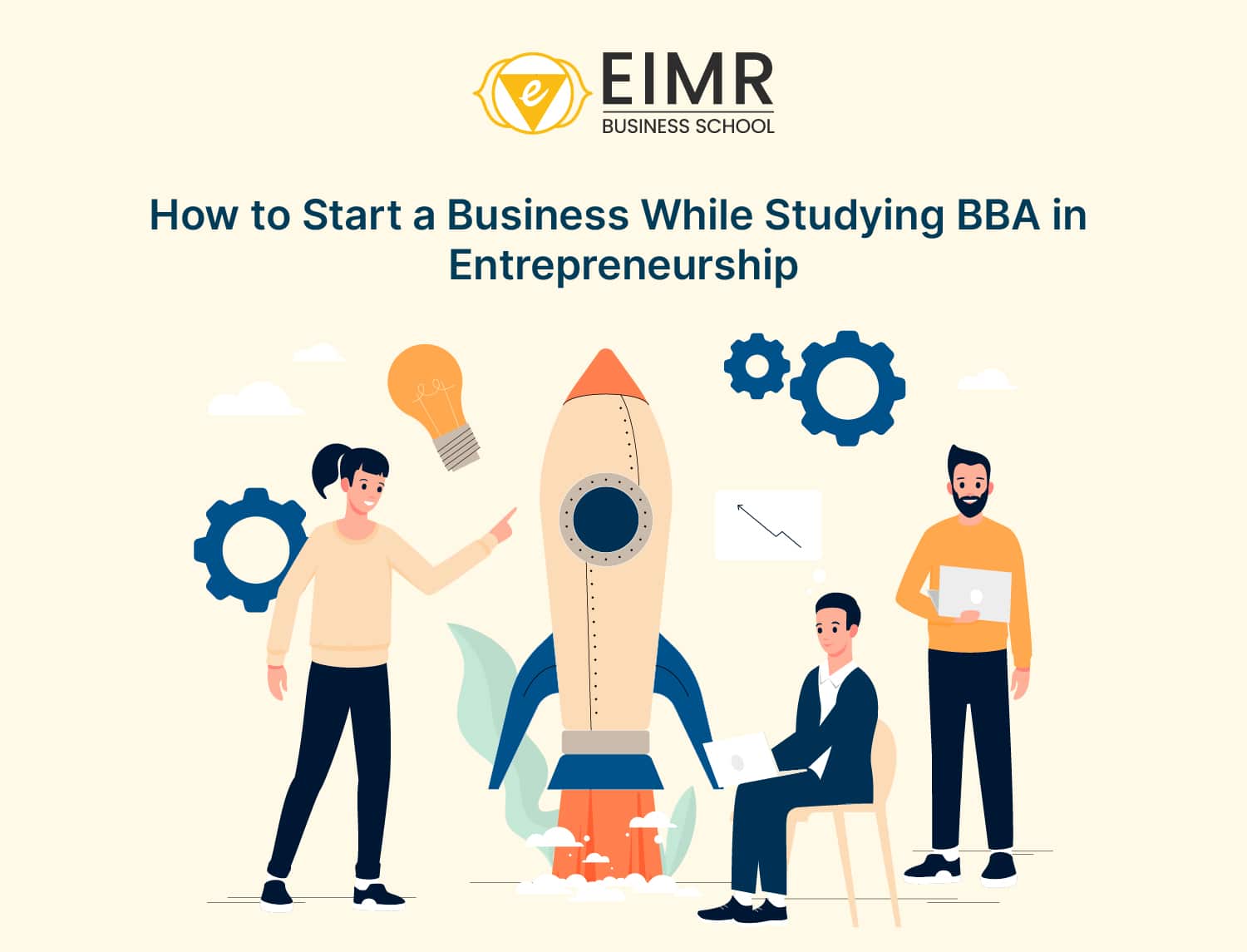Entrepreneurship:
Entrepreneurship, at its core, is the dynamic process of creating incremental wealth and innovating across various sectors. This process involves a blend of risk-taking, vision, and the application of skills to transform ideas into tangible, successful enterprises
Entrepreneurship and Innovation:
Entrepreneurship and Innovation are about questioning the norms and changing how industries operate. Entrepreneurship and innovation are vital for any business to succeed in competitive markets. Entrepreneurs drive innovation, constantly creating new products and services to meet diverse customer needs. They are experts at identifying opportunities, challenging conventional norms, and revolutionizing business processes and marketing strategies. Innovation is not just about developing ideas; it also involves effective execution. Continual innovation is essential for businesses to stay competitive and relevant. It is a learnable discipline, which is critical for successful entrepreneurship. This process involves strategic innovation sourcing, creative problem-solving, and risk management. Entrepreneurial management is key to transforming innovative ideas into tangible business achievements
There is a constant interplay between innovation and entrepreneurial ventures, where innovation triggers entrepreneurial pursuits, and entrepreneurship further advances innovation by putting it into practice. This interdependent relationship is crucial for starting a thriving business and ensuring its continued success and relevance in today’s ever-evolving business landscape.
Evolution of Entrepreneurship:
Characteristics of Entrepreneurship Mindset:
The heart of entrepreneurship lies in an entrepreneurial mindset, which is about identifying and seizing opportunities. This mindset is nurtured through continuous learning and staying updated with industry trends. To cultivate this, enrolling in an entrepreneurship and innovation program can be immensely beneficial. Key characteristics include:
Vision and Mission – A successful entrepreneur should have a strong passion and goal towards their business plan and should stay highly optimistic to achieve their business goals.
Strength – Ability to quickly overcome their failures, and disappointments and step forward towards their goals.
Creativity – Special and unique ideas and thoughts that can make their business different from their competitors and can make them successful.
Risk-taking Ability – Should have the guts to proceed with calculated risk and be quick to make logical decisions in uncertain conditions.
Adaptability – Adapting to new market strategies, logic, and plans
Advantages of Entrepreneurship:
New Innovation and Increasing Economic Growth: Entrepreneurs always tend to innovate something new by introducing new products, services, and business models. This will help in improving good economic growth and job creation.
Job Opportunities: Entrepreneurs, by creating new businesses, will not only benefit themselves but also will increase the job opportunities for individuals in the community.
Wealth and economy: Successful entrepreneurship paves the way to increase wealth not only for the individual entrepreneur but also for the society at large.
Critical Thinking and Problem Solving: The entrepreneurs should identify their root causes and innovative solutions to address them, this can happen only if an entrepreneur is good at decision-making. By this, it improves the lives of individuals and society as a whole.
Types of Entrepreneurship:

Small-Scale Entrepreneurship: The small scale usually deals with a local or regional level with less than 50 employees. Here the main goal is to attain stability and sustain growth. This business often has its scope in its locality and it has a limited scale.
Examples: Small restaurants, Local consultancies
Social Entrepreneurship: The social entrepreneur is all about dealing with social issues and problems beyond profit making. Here the entrepreneur will create and manage the ventures for the benefit of the positive environment. The main goal would be to tackle societal problems.
Examples: Tata Industries, Ashoka Changemaker
Scalable Entrepreneurship: As the name indicates, scalable entrepreneurs will tend to stretch and extend their businesses. They will mostly concentrate on the services or products that can be easily stretched to larger markets. These entrepreneurs are highly conscious of their investments and innovative ideas because of their exponential growth. The main goal is to establish a business that can grow rapidly.
Examples: Facebook, Uber
Large-Scale Entrepreneurship: Large-scale entrepreneurship is wide. It is at either national or international levels. The large-scale entrepreneurs have already achieved their market size and their market presence. It continues to maintain its growth level, focusing on expanding its business and staying as a competitor to its competitors. They have huge employees and will lead corporations.
Examples: Automobile industries, Cement industries
Roadmap to Successful Entrepreneurship Journey:
Becoming an entrepreneur involves several steps, these steps are often covered in detail in the best entrepreneurship courses, providing a structured approach to budding entrepreneurs. They include:
- Conduct in-depth market research.
- Develop a comprehensive market strategy.
- Commit to lifelong learning.
- Build a strong professional network.
- Secure necessary funding.
- Understand and comply with legal requirements.
- Prioritize user experience and market growth.
Becoming a Successful Entrepreneurs:
Innovation – An entrepreneur needs innovative ideas to succeed. This will lead to the creation of a valuable technology, service, or product.
Validation – A vague idea cannot add success to the business. There should be market research to identify the current scope of a product. There should be a competitor analysis. The target audience would be the customers. So surveys should be taken from them to identify the pre-sales.
Taking Risks – To become a successful entrepreneur, we should identify the risk that needs solving. This risk can be in your market plan the target audience or the financial success. Entrepreneurs should be comfortable taking all the risks and should be quick to make wise decisions.
Secure Funding – Funding gives financial support for the entrepreneur to grow in their business. Based on the entrepreneur’s funding, it may vary. It can be a bank loan, it might be from investors who trust and invest their own money to start the business, or it may also be from a venture capitalist.
Launching the Business – Setting up a legal structure, registering the business, and obtaining the necessary licenses so the business can be launched. Develop a marketing and sales strategy to promote your products or services.
Types of Entrepreneurs:

Serial Entrepreneurs:
Serial entrepreneurs are individuals who can start multiple businesses at a time. They run multiple business ventures simultaneously and have a high capacity to bear risk.
Example: Elon Musk
Social Entrepreneurs
Social entrepreneurs work for the improvement of society’s economy. They are motivated and have a desire to create a positive social impact or change through their business towards their society. They focus more on solving social and environmental problems through their innovative business models and ideas.
Example: Ratan Tata
Lifestyle Entrepreneurs:
Lifestyle entrepreneurs are common people who prioritize their personal fulfillment and work-life balance. They start businesses that are relevant to their interests and allow them to maintain a certain lifestyle. The main goal of lifestyle entrepreneurs is to improve their lifestyle.
Example: Blogging, Photography
Technology Entrepreneurs
It is a combination of technology and entrepreneurial skills. Tech entrepreneurs focus more on strengthening their technology to create innovative products or services. They are highly capable of understanding the new technological trends which will constantly motivate them to create new job opportunities in the tech industries.
Example: Bill Gates, Jeff Bezos
Impact of Entrepreneurship in Modern Economies:
In contemporary economies, entrepreneurship is a critical driver of economic growth. For example, India’s impressive ranking as the 5th largest global economy is a testament to the vibrant entrepreneurial activities in the country. Entrepreneurs have contributed significantly to the nation’s wealth, with an injection of approximately ₹139 billion into the Indian economy. This underscores the value of pursuing an entrepreneurship course, as it equips individuals with the skills necessary to contribute meaningfully to the economy.
Traditional Entrepreneurship vs Modern Entrepreneurship:
Traditional Entrepreneurship:
Traditional entrepreneurship only rely on proven strategies and will follow established business models. They have a traditional organized hierarchical structure which often focuses on local markets. They prioritize the stability of the business along with long-term growth.
Modern-Day Entrepreneurship:
Modern-day entrepreneurship are open to accepting innovation and interference. They stick to the current technology and focus on global market standards. They have a level progressive plan and prioritize agility and adaptability.
Technology Entrepreneurship:
Why Choose EIMR as a Right Path?
To succeed, entrepreneurs need more than innovative ideas; they need a comprehensive understanding of the business landscape. Aspiring entrepreneurs are increasingly turning to Bangalore’s startup ecosystem known for offering the most enthusiastic and positive environment for entrepreneurs.
Aspiring entrepreneurs can learn the intricacies of building a business from idea formation to launching and funding a business by enrolling in the EIMR’s PGP in Entrepreneurship and Innovation. The program is designed to bring out your hidden ideas and turn them into successful startups. Here you will get a foundation for your ideas, you will know about the product or service development phase, vital details about funding, and how to scale your business – all that’s required to make you a founder entrepreneur.
EIMR provides all the tools needed for entrepreneurs to start their startups in this program, offering direct and immersive learning experiences from top mentors and coaches. Entrepreneurs will get to access the EIMR’s four business support functions exclusively combined and curated to ease their startup journey. That’s not all, they will get an opportunity to pitch your business to access the ₹ 21 crore seed fund extended by EIMR’s funding partners including Venture Catalysts, Jain Launchpad, and EIMR’s Centre for Incubation.
Tech-Driven Startups:
Nowadays many entrepreneurs have strong tech skills to discontinue the traditional industries and create innovative solutions. Many companies like Book My Show, Swiggy, and more have nurtured their businesses by creating online bookings and online food delivery apps which highly impacted the audience and attracted them to use technology platforms.
E-commerce Entrepreneurs:
E-commerce stands for Electronic Commerce, although there were risks in e-commerce, companies like Amazon, Myntra, etc… have opened up a door to create new opportunities for vendors and sellers. The innovation of e-commerce in today’s trends is highly remarkable. This helped many sellers to set up their online stores and also it reached widely by attracting the target audience.
Social Media Influencers:
Social media influencers are trendsetters. They are gaining social connections with the help of these connections they influence people to buy or try new products. These social media influencers not only influence branded products but also small-scale or lifestyle entrepreneur’s products. These entrepreneurs gain income through their affiliate marketing skills, their paid promotions, and their sponsors. They bring brand awareness and make the product reach the targeted audience.
Technology enabled Service Providers:
The recent evolution of technology, helps entrepreneurs to provide services for their customers and clients in an innovative way. Here is an example, consider a person is a makeup artist or a website developer who cannot work full time, but when they have free time, they want to spend their time wisely. They find their opportunities through freelancing platforms. Platforms like Upwork and WeWork which are the entrepreneurs themselves help people to achieve their goals and offer space to bring their startup ideas.
Artificial Intelligence:
AI has become a widely recognized tool worldwide, known for its accessibility, efficiency, and speed. Its application is not limited to technology, as it is increasingly being utilized in entrepreneurship. For instance, AI is used for market research, analysis, financial planning, and supply chain optimization through apps and websites. To know more about how AI plays a vital role in Entrepreneurship to know more about continue reading.
Conclusion:
The journey of an entrepreneur is about following one’s passion and contributing to society. It transcends age and gender, fostering healthy competition and promoting economic growth. Entrepreneurs find satisfaction in achieving personal goals and contributing to societal advancement. To sum it up, entrepreneurship is a multifaceted field that offers numerous opportunities for innovation and economic growth. Through dedicated courses and programs offered by entrepreneurship institutes, individuals can acquire the necessary skills and knowledge to embark on this rewarding journey. Whether it’s in the bustling economic landscape of India or elsewhere in the world, entrepreneurship continues to be a key driver of progress and development.







